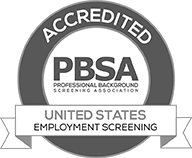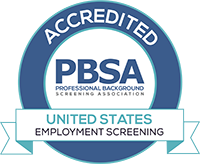BLOG
Hiring And Background Screening In New York
December 11, 2018
New York employers should be aware of and compliant with laws that cover making conditional offers and running background checks on applicants.
Making An Offer
After reviewing a resume and conducting an interview, a New York employer may choose to extend a conditional job offer. This is commonly done via a letter. When composing that letter, it is important to ensure the purpose is clear and the content cannot be construed as a contract or agreement to hire. These letters can include:
· Details about the position including the title and potential start date.
· A statement that says employment is “at will” if the person is hired.
· Relevant contingencies, such as the offer is dependent on the results of a background check.
· Whether or not employment would be subjected to specific terms that will be listed in an agreement document.
The offer letter can also include details about potential compensation, other benefits, time off and related information. However, it should be clear that these are not promises made to the applicant.
Items To Omit From An Offer Letter
New York employers should also be aware of certain things that should not be in a conditional offer letter. A few include:
· Content that implies an official offer is being made.
· Guarantees of specific bonuses or other earnings.
· Language that implies the letter is a contract.
· Statements such as “we look forward to having you on our team.”
· Anything that contradicts the fact that a background check must be run and reviewed before a hiring decision occurs.
Running Background Checks
Every employer must abide by the Fair Credit Reporting Act (FCRA) and relevant state or local laws that cover hiring and background screening where they operate. New York employers should be aware of a group of laws known as the NYC Acts. They include the New York State Human Rights Law (NYSHRL), the New York City Fair Chance Act (NYCFCA), the New York City Human Rights Law (NYCHRL) and the Stop Credit Discrimination in Employment Act (SCDEA).
The NYSHRL allows New York employers to run background checks on applicants after extending a conditional offer. It also defines what types of information can and cannot be used when making hiring decisions:
· Arrests that did not result in a conviction cannot be considered.
· Employers may only rescind a conditional offer due to a conviction if it has relevance to the position or hiring the person would create an unreasonable risk to property or the safety of others.
· Before denying employment, the employer must first perform an assessment using the guidelines established by Article 23-A of the New York Corrections Law.
The NYCFCA states that employers may rely on the results of a background check to help them determine whether or not to hire a candidate. Before denying employment, they must first provide:
· A pre-adverse notification that explains an adverse action is being considered.
· A copy of the document A Summary Of Your Rights Under The FCRA.
· A copy of the inquiry.
· A copy of the background check.
· A copy of Article 23-A
· A copy of the completed Article 23-A analysis.
The NYCHRL stipulates that employers may not inquire about an applicant’s salary history. This is to help eliminate wage discrimination based on gender or other protected factors.
The SCDEA prohibits New York employers from running credit history reports unless one is required based on the type of position.
Staying Compliant
Whether you operate in New York or anywhere else in the nation, you must comply with the FCRA and relevant state laws. Keeping up with them all can be difficult. The team at Backgrounds Online is dedicated to providing educational resources that inform you about relevant laws so you can be aware and plan for compliance.
If you have questions about your screening policies, what type of background checks you need to run for your industry or anything else related to the background check process, please contact us. Our experienced team is ready to assist you Monday through Friday from 5am to 6pm PT.
#BackgroundScreening #Compliance #BestPractices #BackgroundChecks #NewYork







